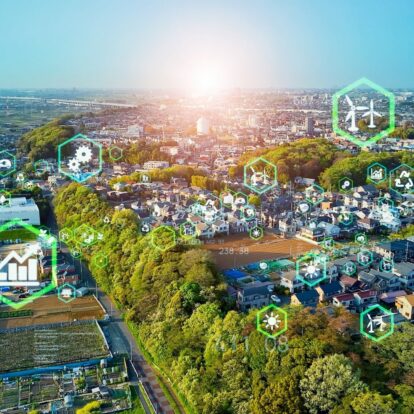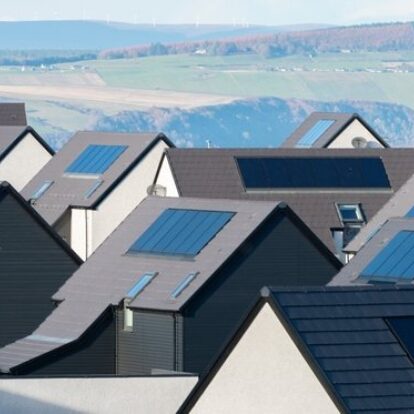Spotlight: Peer-to-peer energy trading
10 Nov 2022

With energy markets in turmoil, UrbanChain discusses why widespread energy generation and consumption will in the future be renewable, decentralised and local.
We are here to revolutionise the energy market for everyone.
Not a sentence to be used lightly, particularly as the UK and indeed the world, continues to navigate tremendous changes in the energy sector.
UrbanChain says this with confidence however.
Because we know that widespread energy generation and consumption will in the future be renewable, decentralised and local.
It was in 2016 that the first recorded peer-to-peer energy trade occurred. It took place in Brooklyn, New York.
A significant moment. One that paved the way for change.
Defining P2P energy trading
When talking about peer-to-peer energy trading it’s important to capture what it is, how and why it works as well as tracking its growth in stature across the globe.
In its ‘Peer to Peer Electricity Trading – Innovation Landscape Brief’, the International Renewable Energy Agency (IREA) said: “Peer-to-peer (P2P) electricity trading is a business model, based on an interconnected platform, that serves as an online marketplace where consumers and producers ‘meet’ to trade electricity directly, without the need for an intermediary.”
Further explanations come via Community Energy England: “P2P energy trading allows consumers the choice to decide who they purchase electricity from, and who they sell it to.”
And from Deloitte: “A virtual marketplace that allows parties to buy or sell energy, managing price and volume risk themselves, optimising the traditional role of the Energy Retailer, and gaining access to additional financial and non-financial benefits.”
Bring in Nesta’s: “Greater adoption of local small-scale renewable energy generation (‘microgeneration’) — such as using solar panels or wind turbines — may be instrumental in achieving the UK’s net zero target,” and you can start to knit together the overall benefit to people, business, industry and indeed the health of our planet.
The Uber of energy
In the weeks and months following that first deal being done in Brooklyn, P2P electricity trading became known as the ‘Uber’ or ‘Airbnb’ of energy.
Why?
Because the platform enables local distributed energy generators to sell their electricity. And to sell it to consumers who are willing to pay the price that is set.
UrbanChain’s journey started in 2017, which saw us become the first British renewable energy exchange company.
That title is with us more than five years later. In that time numerous start-ups related to P2P energy trading have risen to the fore in multiple countries.
Many are bringing forward their own fight to transform energy markets in their respective countries.
Decentralising energy
In the UK, the move towards a more decentralised energy system presents significant challenges.
We have overcome many, whether technological or regulatory.
That’s largely thanks to eChain.
It’s our product, a peer-to-peer energy exchange system driven by artificial intelligence and blockchain.
We call it the Peer-to-Peer Exchange.
Over five years local authorities, housing associations, private companies from a multitude of sectors, energy suppliers and renewable energy generators joined our exchange.
And they remain onboard as onboarding continues at pace.
The alternative, safe and unique energy market for renewables that we have created means the future of UK energy is already here.
Corporate and household consumers are placing orders for electricity and local generators are meeting them.
While decoupling renewables from the gas market and overcoming the intermittency and fluctuation of renewables, our exchange is taking care of profiling, aggregating, matching, balancing, settling, billing and managing generation and consumption in the most accurate, transparent and secure way.
Deloitte’s P2P predictions
“We believe that P2P energy trading,” it reads, “has the potential to be one of the key catalysts for change and transformation towards the future of the electricity market, system and infrastructure.”
It also says: “We believe that businesses should actively explore the financial and environmental impact that P2P energy trading could have.”
The upshot is that P2P energy trading is growing. And that will not stop. The only question is how long it will take to become more widespread.
Presently we have consumers on our platform that are buying 100% green energy and saving at least 25% on bills.
Renewable energy generators onboarded are getting at least 25% better margins and are earning more money in the medium to long-term.


